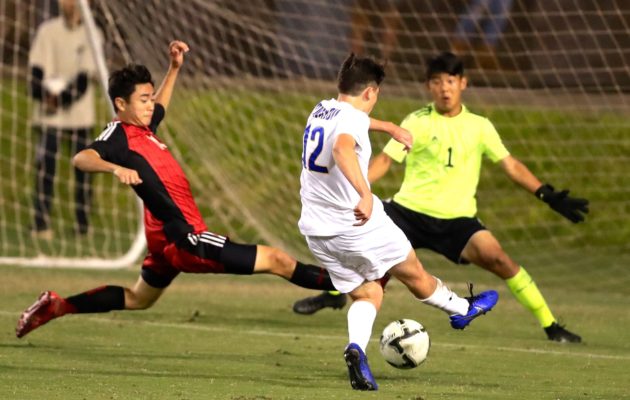
Head referees in Hawaii high school soccer have always had a major say in when a match ends.
Similar to soccer at the world level, the head referee in Hawaii uses a watch to determine the timing of the match. He or she stops it when necessary for various reasons, such as goals scored, injuries and when a team is stalling.
Under a proposal to be discussed next week at the Hawaii Interscholastic Athletic Directors Association meeting on Kauai, the head referee would still determine when the clock stops, but he would no longer be the one actually controlling the clock.
The proposal was submitted by the BIIF. The HIADA conference is June 4-6 at the Kauai Marriott Resort in Lihue.
If it passes, then during all boys and girls state tournament games on the Waipio Peninsula Soccer Stadium field, an official timekeeper would control the scoreboard clock and it would wind down to 0:00 to end all periods of play.
This is the recommendation by the National Federation of High School Associations’ rule 6-2-2, according to the BIIF in its stated rationale for the proposal.
Furthermore, the BIIF states its rationale for the rule change as: “The scoreboard at the stadium is well lit and highly visible. This change will remove all of the end-of-the game questions out there regarding exactly how much time is left in any game. This procedure has been in place for years in college play. This will also help with the new NFHS rule in place for 2019-20 regarding the clock being stopped whenever the leading team substitutes in the last five minutes of play.”
As it stands now, state tournament matches at the Waipio Peninsula stadium use the scoreboard clock as an unofficial timekeeper. It runs down from 40 minutes to two minutes and then is turned off. The referee keeping the official time decides when to blow the whistle, signalling the end of a half or overtime period or game.
For many new fans to the sport, it can be confusing. Typically, they’re expecting play to stop when the clock ticks to zero like in most other sports.
Asked for their initial thoughts on the possible rules change, Kalani boys coach Mike Ching said he was against it and ‘Iolani girls coach Kristin Masunaga said she was for it.
“Personally, I don’t like it,” Ching said. “I don’t like the fact that we wouldn’t be playing with it the whole year and then for the playoffs have it. There has to be consistency. And, it takes the drama out of it for me. There is a mystery in extra time and that’s just something there has always been in soccer.
“If you get a corner kick in the last 20 seconds in this new system, if it runs out, it runs out. In the old soccer world, the referee is most likely going to let you get that corner kick. And hiring a clock operator, that’s another cost. But I notice, nobody seems to be complaining about that in college.”
Masunaga would welcome the change.
“Every other sport displays time,” said the Raiders coach, who played at Colorado College. “We don’t. The referees can add (by stopping the clock) as much time as they want now. If the rule changes, the referees can’t ambiguously add time for what they think accounted for (lost time). We’ve been affected both ways in the past, winning and losing because a match didn’t end (when it seemed like it should have). In the ILH, they’re supposed to tell us when there are two minutes left. Sometimes they do and sometimes they don’t.
“(The new rule) would be more fair. Everyone would know how much time is left. If teams do start to stall, maybe the referee will signal to stop time.”
As for the corner kick example that Ching mentioned, Masunaga said that if time was running out and there was an upcoming corner kick, maybe the referee could have the discretion to stop the clock in order for the attacking team to set it up.
COMMENTS